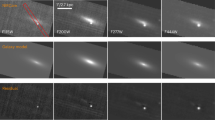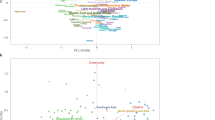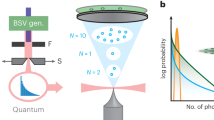Abstract
BOTHE and Kolhörster1 wore the first to show that the cosmic rays manifest themselves to us as highly penetrating corpuscular rays. Direct experimental data on the nature as well as on the energy of these rays are still lacking; they might be obtained by experiments on the magnetic deflection if a sufficiently large and intense magnetic field could bo reached.
This is a preview of subscription content, access via your institution
Access options
Subscribe to this journal
Receive 51 print issues and online access
$199.00 per year
only $3.90 per issue
Buy this article
- Purchase on Springer Link
- Instant access to full article PDF
Prices may be subject to local taxes which are calculated during checkout
Similar content being viewed by others
References
W. Bothe und W. Kolhörster, Zeit. f. Phys., 56, 751; 1929.
B. Rossi, Rend, Lincei, 11,478; 1930.
L. M. Mott-Smith, Phys. Rev., 37, 1001; 1931.
B. Rossi, Phys. Rev., 36, 606; 1930.
Author information
Authors and Affiliations
Rights and permissions
About this article
Cite this article
ROSSI, B. Magnetic Experiments on the Cosmic Rays. Nature 128, 300–301 (1931). https://doi.org/10.1038/128300a0
Issue Date:
DOI: https://doi.org/10.1038/128300a0
This article is cited by
-
Influence of a magnetic field on the absorption of electrons in aluminum
Soviet Physics Journal (1974)
-
Solid iron magnets used in the durgapur cosmic ray spectrograph
Proceedings of the Indian Academy of Sciences - Section A (1971)
-
Model experiments on the design of solid iron magnets for use in cosmic ray spectrographs
Il Nuovo Cimento (1960)
-
Ricerche sulla componente dura della radiazione penetrante eseguite per mezzo di nuclei di ferro magnetizzati
Il Nuovo Cimento (1943)
Comments
By submitting a comment you agree to abide by our Terms and Community Guidelines. If you find something abusive or that does not comply with our terms or guidelines please flag it as inappropriate.



